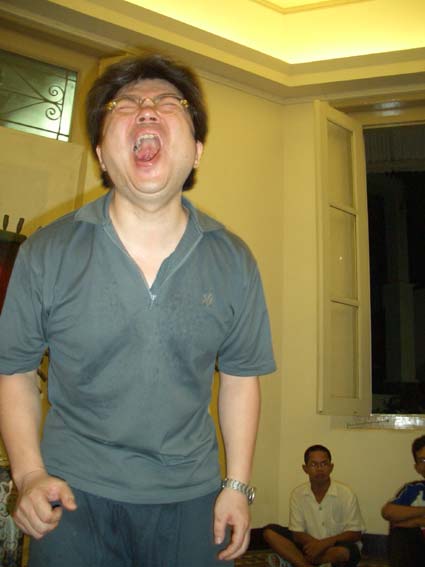

1959 May 7 Born in Toyama city ,Japan
1978-83 Tokyo Metropolitan University, B.A. of Chinese modern literature under
Mr. IIkura Shohei
1981-87 Bigakko Art School, majored in intaglio prints under Mr.YOSHIDA Katsuro
1990-91 Musashino Art University, M.F.A. give up School
1992-94 Teaching at Nyumba ya Sanaa Art school ,Zanzibar,Tanzania
Selected ingtaglio works
Selected performances
1982 "sound"&"voice"&"language" in Tokyo, Japan
1983 "Heavenly injection afternoon"Akagi Electric (+SAEGUSA Yukio+HOSHINO Masaharu+QUSUMI Takuya+AKAGI Noriko)
1984 "Flirting gristle 2"with TANAKA Toshi
1986 "for Basement of Keio Univ."Kroitzfeld Jacob (+KUWAHARA Masahiko +TANIKAWA Mari)
1987 "for Basement of A-Mike, NYC "The Force of job sites= FJ (+SAEGUSA),NYC
1988 "Sun flower, Hiroshima, Not for Deadly Emperor"with SONODA
Satoshi
1989 "The shit for Emperor funeral" with SONODA
1990 "Infant minds" (+KUWAHARA, TANAKA,SAEGUSA, YANAKA Masanori)
1991 "for The wanderer with his shadow"FJ (+SAEGUSA+TANIKAWA)
1995 "50 years after losing the war", "A imagination from
end of life" FJ (+SAEGUSA)
1996 "The labor of dream, The dream of labor" Happy-Lucky Stories (+SAEGUSA +TANIKAWA+SUZUKI Takeo)
1997-98 "Tribe conflict--Majority vs. Minority"
1998 "The 9th Korea-Japan Dance Festival in Seoul"
1999
Participated"Nippon/Japan International Performance Art Festival (NIPAF)"also 2000
"Row Your Boat for Japan society" FJi+SAEGUSAj in NYC, USA (NPAF tour)
"Happy Japan! Happy family!" The 10th Korea-Japan Dance Festival in Tokyo, Japan
2000
"Happy Japan!" Jakarta, Taipei, Tokyo(NIPAF tour)
"Happy Japan"The 1st Open Art Festival in Beijing,China,
2001
"Happy Japan!", "Daily Life" EXIT festival inHelsinki,Finland
"Tourist #1- Revolt impossible""Tourist #2-Revolt unuseful","Please take care of my wounds" ,The 2nd Open Art Festival in Sichuwan,China,
2002
"I am very moved"Bridge for our relationship with Chen Sisen in Tokyo Japan
"Happy Hong Kong!", "Happy Communist party of China!",
"Happy Japan!", "Happy Japan! --I was very moved" Hong Kong
"Tourist #3--Globalism"Guangzhou, China
"Tourist #4--Globalism/Internationalism" ,"Happy Japan!" The 3rd Open Art Festival in Xi'an, China
"Tourist #5: For E. H. Norman" 7a*11d 4th International Festival of Peformance Art in Toronto, Canada
"Tourist #6:YOU ARE NO GOOD" The 4th ASIATOPIA 2002 in Bangkok & Chiangmai, Thailand
2003
"Tourist #6:YOU ARE NO GOOD" Beijing-Tokyo art project Beijing, China
"Tourist #7:VIVA Globalism" PIPAF Manila, Philippine
"Tourist #7:VIVA Globalism!--at ex-capital city of Manchukuo--"The 4th Open Art Festival in Changchun, China
2004
"I like Japan!" The International Performance Art Festival in Bandung, Indonesia
"Tourist #7:VIVA! Globalisation--Azinomoto""Tourist #8:Jun-ichiro"Wed Action #4 in Jogjakalta, SOLO ACTiON! in Solo,@Indonesia
"Tourist #7:VIVA! Globalisation--Azinomoto""Tourist #8: Jun-ichiro--Our primeminiter" 2nd DaDao Live Art festival in Beijing, China
"Tourist #9: International""Tourist #10: Thank you ,Joseph Beuys"The 5th Open Art Festival in Beijing, China
2005
"VIVA globalisation!--Washing audience feet" Performance Site :Myanmar 05 "Borders : withIn withOut" in Yangon,
Myanmar
"Tourists #11 We Have Good Constitutions" 3rd DaDao Live Art Festival in Beijing, China
"Tourist #9 International", "VIVA! Globalisation--Azinomoto" June Art Action Live Art + Music in Hong Kong, China
"Happy Japan! --Memory for Tainan private middle school of Presbyterian
Church in days of occupation by Japan" Reach Outlying_2005 TIPALive in Taipei, Taiwan
"Happy Japan! for Shu Yang" The 6th Open International Performance Art Festival in Chengdu, China
"Happy Japan! " The new world maps in Tokyo, Japan
"Happy WTO!", "VIVA! Globalisation"Artists in Action -the Power of the PowerLess!-in Hong Kong, China
2006
"VIVA! Globalisation" Moving Wall project of outlounge in Tokyo, Japan
"YOU ARE NO GOOD -tourist #6-" FOI3: Future of Imagination 3 in Singapore
"Tourist #8 International" Great East Asia Co-prosperity Restaurant in Tokyo with TAKEDA Ken-ichi
"We love Kiko - Mother of 3G Emperor" The 7th Open International Performance Art Festival in Beijing
"Viva! United States -for Herbert Norman" , "Arigatou Joseph Beuys - Thank you Joseph Beuys"Viva! Art Action in Montreal, Canada
"Happy Bijyutsu-Techyou!","Arigatou Joseph Beuys - Thank
you Joseph Beuys"Japanese action art after "ZERO Dimension" 60's legend art group
in Tokyo, Japan
"Happy Japan! for Shu Yang" Birds Migration in Jakarta, Indonesia
2007
"Arigatou Joseph Beuys - Thank you Joseph Beuys", "Happy Japan!"THE CAT SHOW Cardiff Art in Time International PRRR-formance Art in Cardiff, UK
"Viva! Globalisation for Ding Ling" June-Alliance in Beijing, China with Wang Ru
"Arigatou Joseph Beuys - Thank you Joseph Beuys", "Happy Japan!","Viva! Globalisation for Hisao and Fudeko" Art of Encountering Issue II in Germany
"Viva! Globalisation for Ding Ling" The 8th Open International Performance Art Festival in Beijing with Lee Kwangnan
About "Happy Japan!"
ARAI Shin-ichi
edited by Shu Yang in NEXT WAVE (art critic/performance artist)
translated in English by HOSHINO Roka
*This text was written for Chinese monthly art magazine "NEXT WAVE"
(December 2001 the last issue) which was banned.
I (a 42-year old unmarried man) get up at 8:30 a.m. and leave home
(60,000 Yen/month: 6m x 8m, telephone bill: 5,000 Yen/month, heat,
light and water expenses: 10,000 Yen/month, note: 1 USD = 120 Yen, 100
Yen = 0.83 USD ) at 8:50 a.m.. After a 10-minute ride, I park my
bicycle at a parking place (2,500 Yen/month) in front of the station.
Buying a ticket (400 Yen), I take the Chuo rapid train to Nakano,
Tokyo. Even during off-peak times, the train is so crowded that one is
unable to hold open a newspaper. After a 20-minute ride, I reach Nakano
and switch to the Tozai subway line. As it starts at Nakano, I can get
a seat. And another 20 minutes, I arrive at my workplace for the day, a
publishing company. At work I read the proofs of computer magazine
(20,000 Yen/day). At lunchtime, I eat a plate of sliced raw fish (800
Yen), buy a pack of cigarette (250 Yen) and a can of tea (120 Yen). I
get off work at 6 p.m., call the head office of the employment firm by
mobile phone (5,000 Yen/month) and learn that I have no job the next
day. I step into a book store and buy the book, "Conceptual Art" (4,400
Yen), which I have been wanting to get though somewhat expensive for
me. I go to Budo-ya, which is my favorite bar, and order a bottle of
wine (2,400 Yen). Complaining to my barmates about my job, other's art
performances and so on, I am getting dead drunk. At 0:30am, I pay the
tab (5,000 Yen) and take the last train home (450 Yen) which takes an
hour. The last train is crowded with many other drunken people like me,
and as a matter of course, I cannot get a seat.
Though I declare that I am an artist, basically I set off for work on a
crowded train to earn money, like the average salaried worker. The
onlydifference between them and me is that the total number of days I
work
varies between 5 and 20 days a month, which I have no control over.
The uniform I wear in my performance, "Happy Japan!", is the uniform of
Japan Overseas Cooperative Volunteers . This body, sponsored by the
Japanese government, dispatches Japanese men and women under the age of
40 to developing countries for 2 years to teach the local people
various things, such as the Japanese language, how to repair cars,
agriculture techniques, computer systems, and so on. For example, many
young people have been dispatched to various region of China as
teachers of Japanese or agriculture. From 1992 to 1994, I taught art,
mainly printing art, at a newly established art school in Tanzania,
East Africa. To get into the Japan Overseas Cooperative Volunteers, I
had to take an examination and participate in a training camp for about
3 months. I told my office, parents and friends that I would go to
Tanzania for 2 years, decided to have a friend live in my leased house
during my absence and got the householder's approval. That is to say, I
participated in the camp with the understanding that I would leave
Japan. There was also another reason that I had only 10 days by the
departure after finishing the camp. On the last day of the training, we
had "an audience" with the Emperor, who is the president of Japan
Overseas Cooperative Volunteers. Despite my convictions (I oppose the
Emperor system), I decided to attend the audience along with many
others. I reasoned that if I were to refuse and this disqualified me
from participating in the Tanzania volunteer work, I could take a legal
action against the Japan Overseas Cooperative Volunteers. But I did not
refuse it because I had been frightened by our instructors in the
training camp who said that if I did such a thing, I would be prevented
from getting into Japan Overseas Cooperative Volunteers on false
ground, such as health problems or a bad attitude during training. Thus
I gave preference to avoiding the problems which might occur if I were
expelled, such as possibly being unable to get my old job back, causing
my friends trouble or my parents ashamed, litigation and so on.
The "Senso-ron ("War Theory")", which I crowd into my mouth in my
performance "Happy Japan!", is a controversial cartoon by KOBAYASHI
Yoshinori --one of the main members of the "Body to Write and Publish a
New History Textbook in Japan"-- and has already seen sales of around 1
million copies mainly among young people in the 2 years since it was
first published. During World War II, the Japanese Imperial Army
compelled many women in North and South Korea and Southeast Asia to
come to the military camp to provide sexual services (they were called
"comfort women" by the military). Though they were sex slaves for the
Japanese soldiers, KOBAYASHI has insisted in his cartoon that they were
just prostitutes because they were paid for their deeds. This
insistence that the Japanese troops did not do wrong to them, in my
mind, shows Kobayashi's lack of sympathy and selfishness. On the other
hand, I did not I want to be part of the Japan Overseas Cooperative
Volunteers --a so-called "peaceful army"-- that imposes Japanese
culture upon other developing countries in the name of the Emperor, its
titular head, and was repulsed by an image of myself as a latter day
imperialist taking advantage of the strength of the Yen and holding the
hands of so many desperate girls in Tanzanian bars.
I think it is all the more dangerous that nowadays many young people
with only a dim awareness of history are able to absorb themselves in
the truth-twisting work of KOBAYASHI Yoshinori. But I had the same
experience 25 years ago. It was a time when I had had been having my
doubts about the Japanese history taught in the high school and was
bothered by the contradiction I found in society. I knew of HANI Goro,
who was a historian specializing in Marxism, and was affected by his
work. It was 1975, a time when Japanese left-wing student activism was
at its peak, and HANI had inspired many us with his Marxism historical
view. In those days, he had written more essays of social criticisms
expanding on his historical view than books, and energetically
delivered lectures at universities, etc.. He had repeatedly asserted
"All of the various problems in Japan result from the capitalism
system. To get rid of them, Japan should change to a socialist or
communist system." or "It is said that many innocent people had been
purged by Stalin, but even so, Russia is a more livable land than the
current Japan." He also said that "The Great Proletarian Cultural
Revolution in China was an experiment about the direct participation in
politics by the common people. How wonderful event it is. In every
respect, socialism is superior to the capitalism." That was my first
contact with socialism, and I was overwhelmed by its power. Compared
with the reality of Japan at that time, I thought the socialist
countries he told of were like a dream.
For that reason I thought for a long time that the reporting about
socialist countries, e.g. China, Vietnam, Cambodia, Former Soviet
Union, the Eastern Europe countries, North Korea, etc., or about
international affairs involving such countries were fabricated by press
agencies in the capitalist countries (Western powers). For example, I
had a vague sense that the holocaust by the Por Pot faction of Cambodia
was exaggerated by the Western powers. (That is to say, I thought that
in a socialist country such a dreadful thing could not be done and that
such information would be fabricated by the Western powers to make us
believe the socialist countries were wrong and bad. In fact, there were
false reporting about the Vietnam War or Cuba.) And I did not so much
as think about the things being done in the socialist countries from
various angles, nor did I conceive what the ordinary people living
there were feeling. In the end of 1980s, only after the revolution
began in the East European countries, I gave up my fixed ideas of
socialism vs. capitalism (or left vs. right, East vs. West) and could
see things from ordinary people's perspective, in other words, from
their viewpoint, as if I were there among them.
I know well no matter how I try to tell young people who support
KOBAYASHI Yoshinori, "You are being taken in by the conservatives, such
ideas are dangerous as they persuade people to try to eliminate aliens
in Japan, push the ideas of Japan on other nations and prevents people
from thinking of their common concerns", my advice would not be easily
received. I had also clang to the hardened idea that even newspapers
reports were fabricated by the rightists. Well, how can I come face to
face with such young people? How can I open my mouth to them? Is it a
good to debate them in web forums? Should I send my opinion to
newspapers or magazines? Or should I participate in citizen's movements
against their actions?
***********************************
That was in the morning on December 20, 2000.
"In conclusion, it was decided not to issue visas for the two Chinese
men this time. We cannot give you the reason as it was an official
decision. The principals will be notified later.", an officer of the
Foreign Ministry in Japan said. I was struck dumb with shock as I heard
his words through the telephone receiver. The eve of the next day was
the deadline for them to be able to get visas to come to Japan, and now
we were issued the ultimatum. We had already got the air tickets for
them and were waiting for the visas to be issued. But as the visas were
still not issued after so long, I had called the Foreign Ministry
almost every day for the past week. However, all I got was the fuzzy
answers.
SHU Yang and CHEN Jin, who organize Open Art performance festival ,
were applying for visas to participate in the event on December 23 and
24, 2000, "Perspective Emotion 3" (the 1st and 2nd events of the series
had already been held in 1998 and 1999 under the directorship of MUKAI
Chie), for which I worked as one of executive members. To get a visa
for the artists, it was necessary to have the Japanese government
recognize that the "Perspective Emotion" was a sound event, but we
couldn't seem to do it for lack of time. So this time, we applied for
their visas differently: invited them as a private citizen to visit
from China. As the guarantor, I prepared the following documents:
1. Papers describing the purpose of their coming to Japan, the
detailed schedule and the consent form to be their guarantor during
their stay in Japan
2. The prehistory of how we came to know each other
3. Something to testify to our friendship, e.g. picture, letter, etc.
4. If I had been to China, the copy of my passport from that time
5. My tax certificate
6. My resident card
I had to submit these documents to the Japanese Embassy in China
through SHU Yang and CHEN Jin. Of course they made and submit their own
required documents by themselves. Concerning 5, my income was 1.4
million Yen in the tax certificate. As my friend who had invited her
Chinese friend from China to Japan before said to me that the required
income to invite people from China was around 5 million Yen, I made
certain of it with the Foreign Ministry and got a reply that the amount
was not so impossible. Therefore I asked my salaried-worker friend to
be another guarantor for them and added his tax certificate because
among the members of "Perspective Emotion" I was already one of the
highest earners and none of them would have been able to help out much.
Why wasn't the visa issued even after preparing such adequate
documents? I only discovered the answer after a week-long dialogue by
telephone with government officials that the Foreign Ministry did not
want to issue the visa to Chinese people. It holds not only for China
but also all other countries which require a guarantor on the Japanese
side before they can apply for a visa. On the other hand, when Western
people come to Japan on a tourist visa, a guarantor is not necessary.
The officer in the Foreign Ministry explained in a business-like tone,
"This time, it looks like it is going to be difficult to issue their
visa.". Still I was insistent, until he said, "Imagine if Chinese
people could easily come to Japan. You would feel uneasy, wouldn't you?
That is why we have to carry out such strict examinations.". Is it
possible for them to come to Japan "easily" under such strict
conditions? Or, can't a poor Japanese person invite a friend to visit
from China? Do they think that poor Japanese plan to help Chinese
people enter and stay in Japan illegally?
Three months later (February,2001), I met with CHEN Jin at the "EXIT"
Performance art festival (under the directorship of Roi Vaara) in
Helsinki, Finland. I asking him if it was difficult to get a visa for
Finland, He said with a smile, "No Problem!".
After that, in the spring in 2001, the issue of embezzlement of secret
funds began to surface. Taking advantage of the fact that the secret
funds do not have to be reviewed by the Audit Board, an official of the
Foreign Ministry had been skimming off no less than several hundred
million Yen for years. However, though this issue was dealt with as his
personal crime, it is said that it might actually be a conspiracy by
Foreign Ministry officials along with politicians. Assuming that people
in poorer countries than Japan might come here and commit a crime, the
Foreign Ministry does not give such people visas, does not give any
clear reason for denying them, and -when confronted-- finally says it
is for the national interest. However, even if the visa is granted to
persons who somehow prepare perfect documents and excellent guarantors,
they will not commit a crime graver than what those officials of the
Foreign Ministry did, something which did indeed the national interest.
By contrast, the non-issuance of visa will damage and confuse personal
relationships and increase the level of anti-Japanese feeling (most of
such people are in neighbor countries). I think this actually hurts the
national interest more.
After all, I go on my performing. Always there is just a small
audience. Here in Japan, which is said to be rich, to be mature
democracy, to have freedom of expression, all I can do is just cry
"Happy Japan! Happy Japan!"
![]()

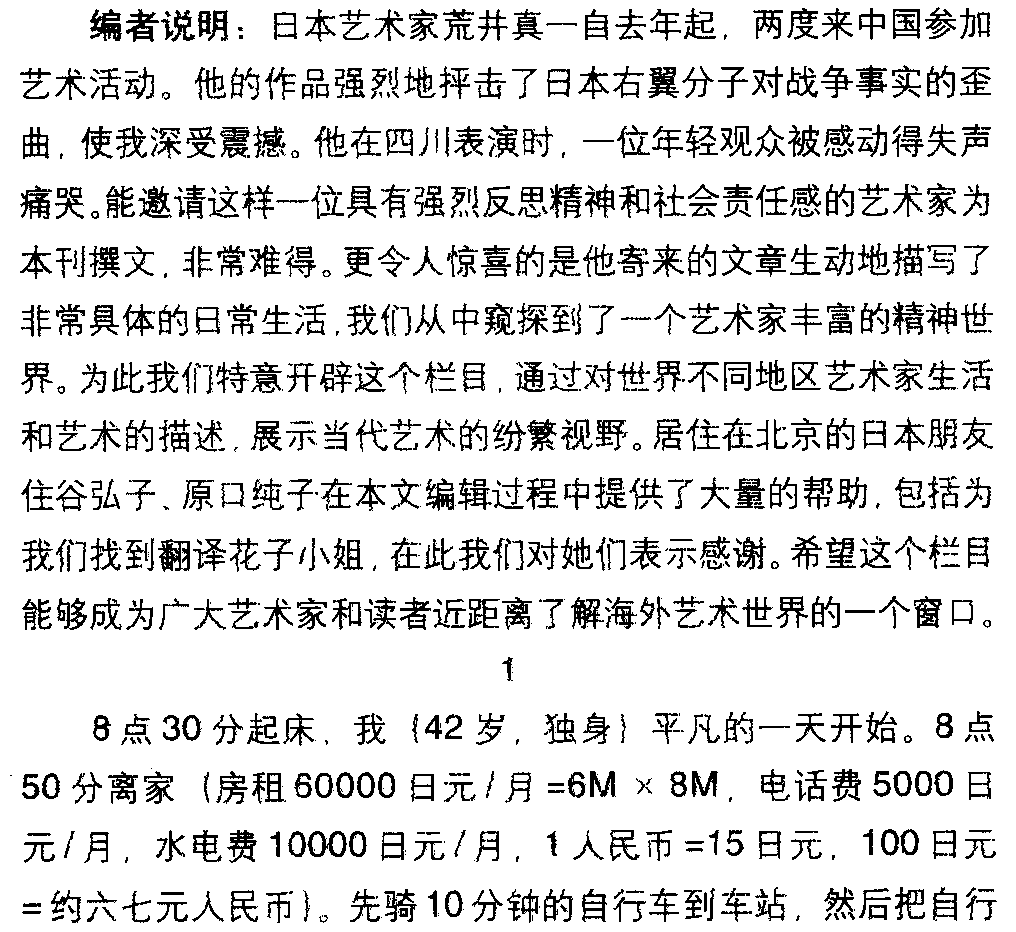
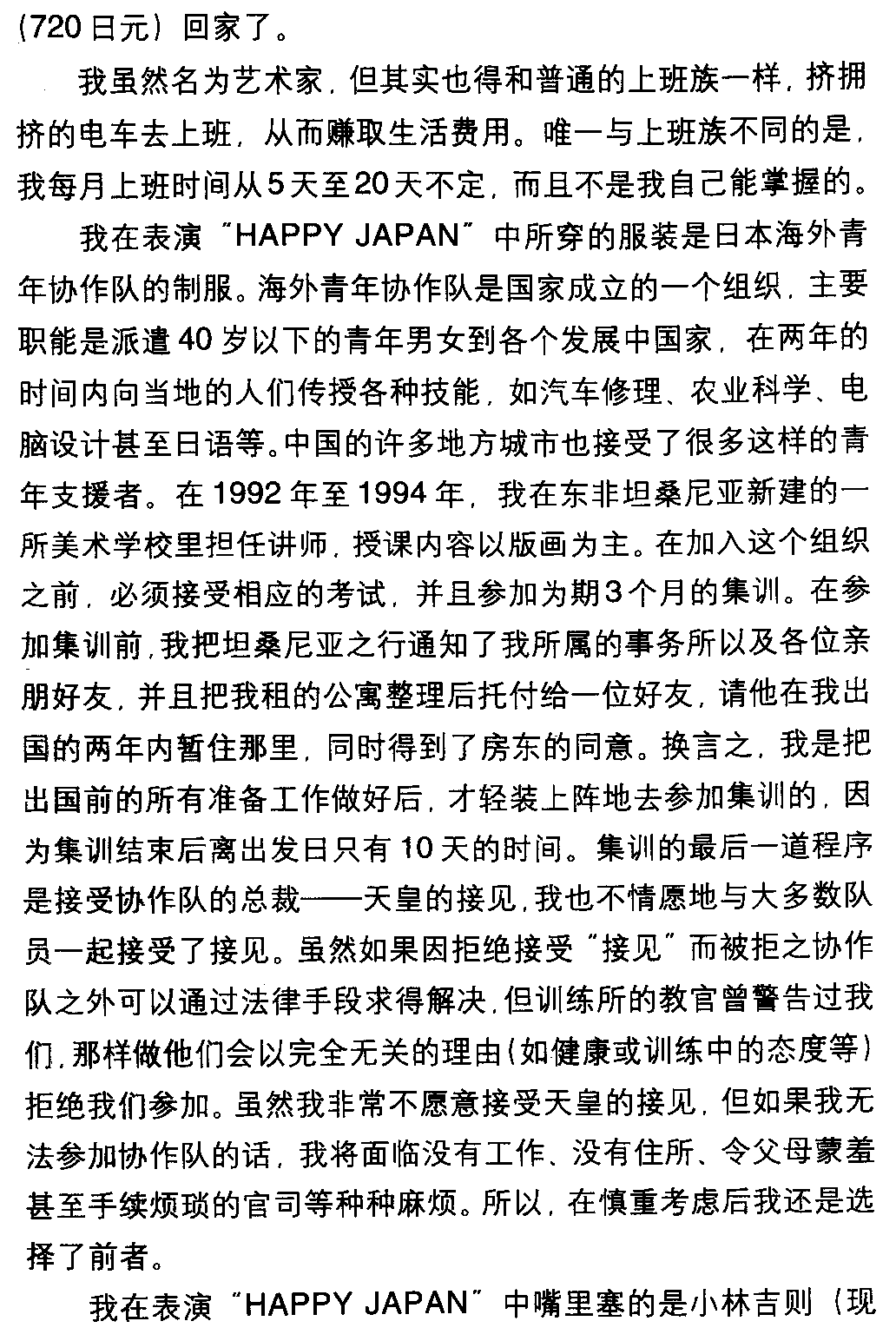
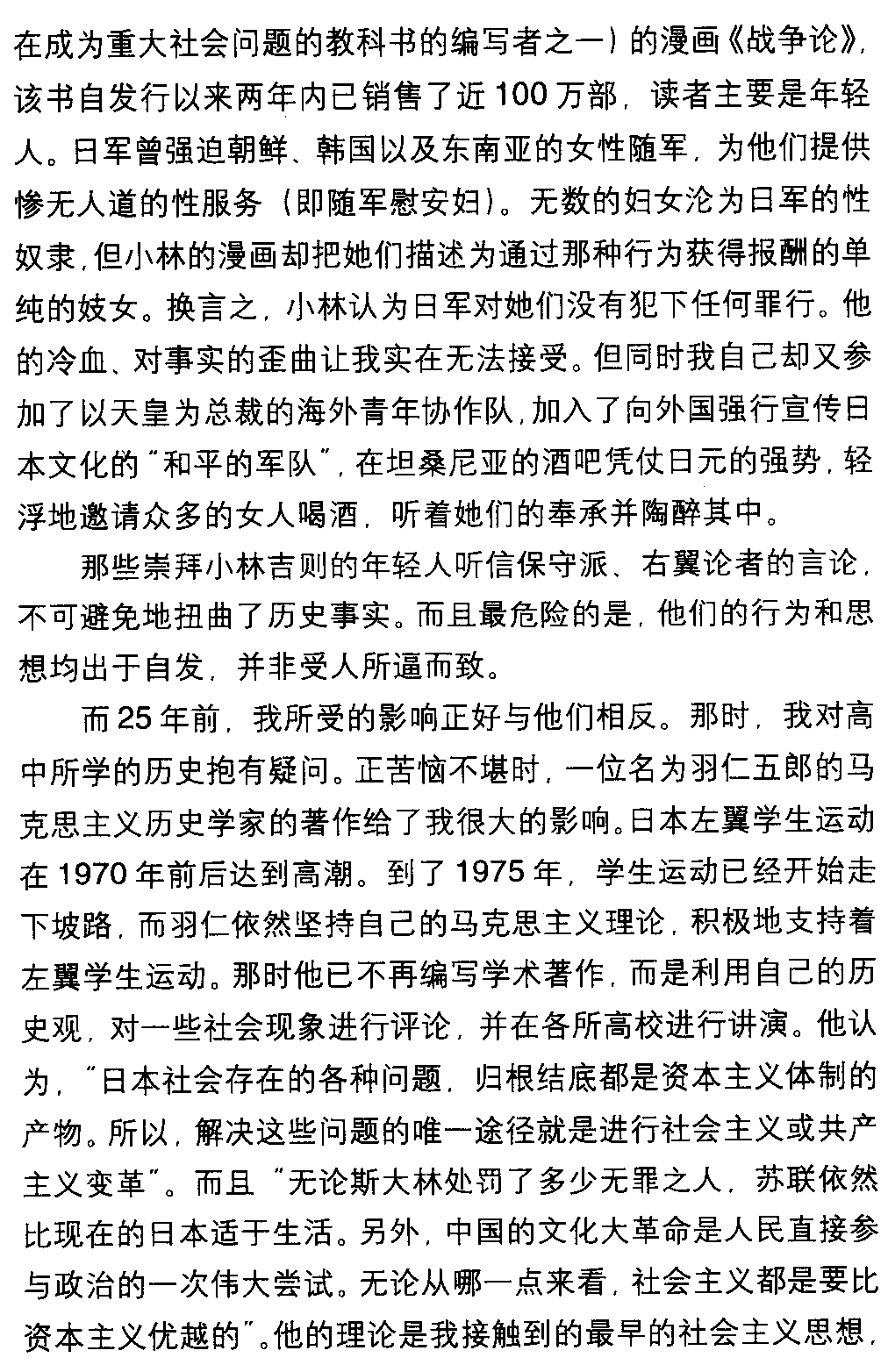
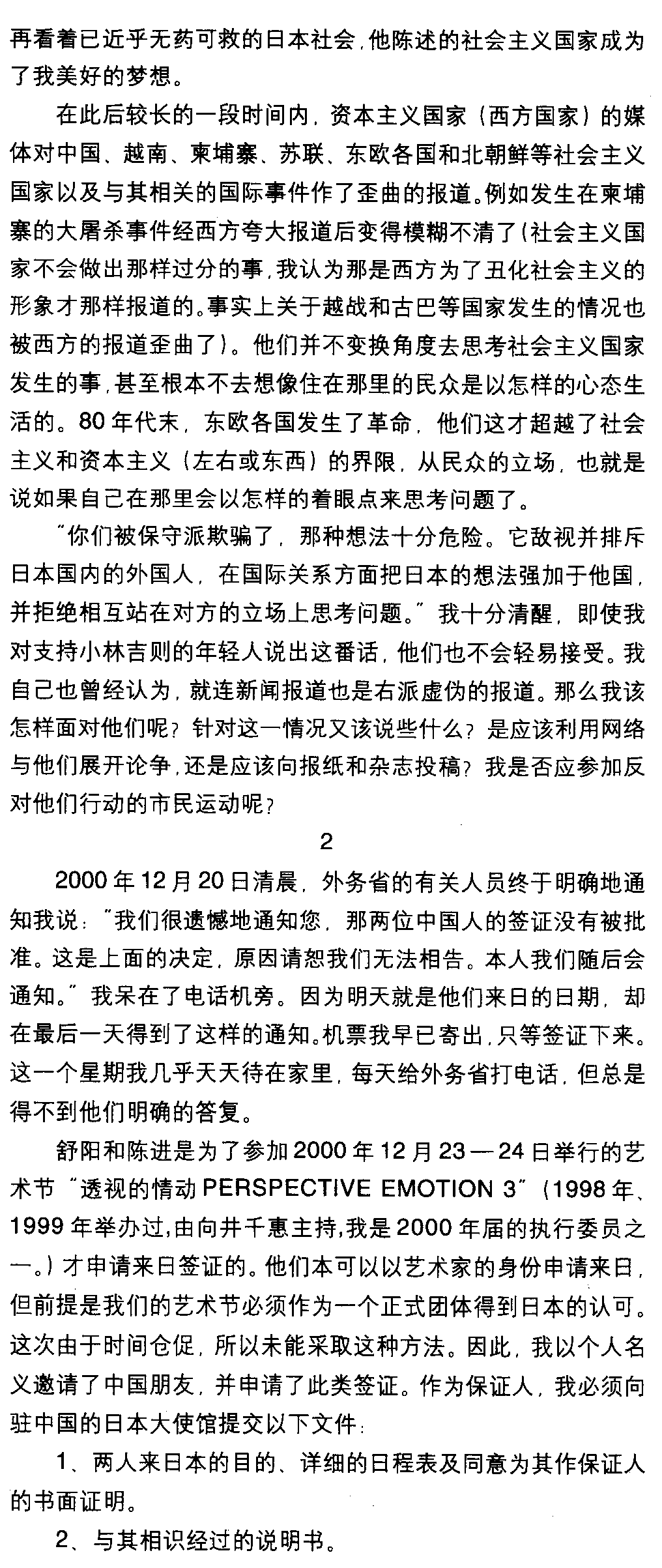
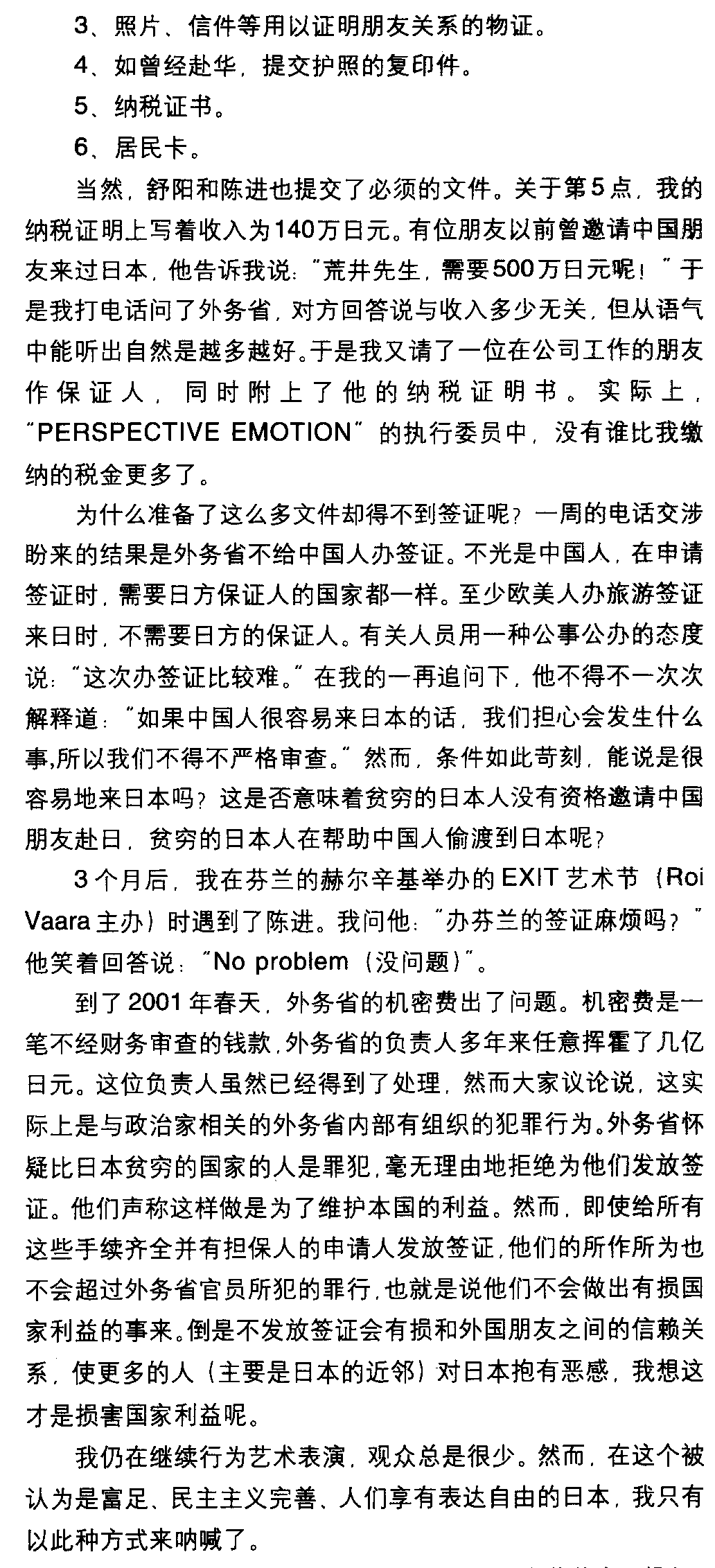
©2001, NEXT WAVE magazine
©ARAIart.jp